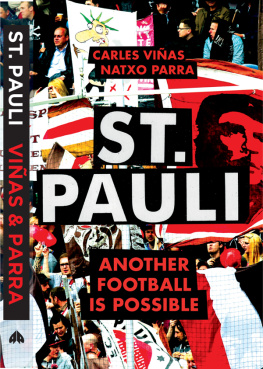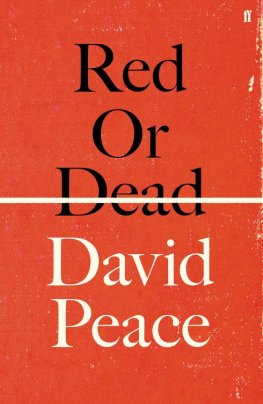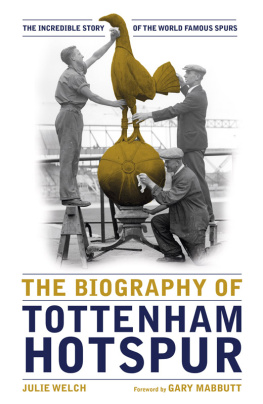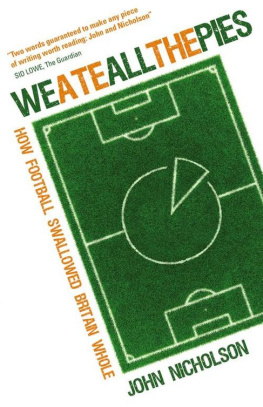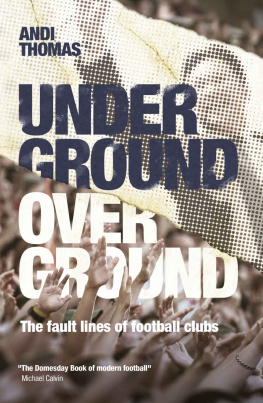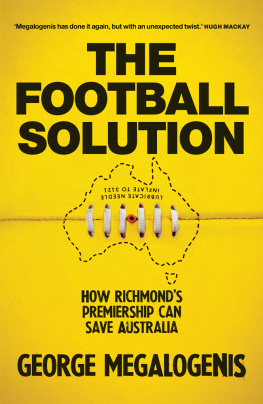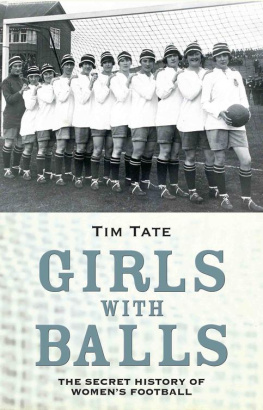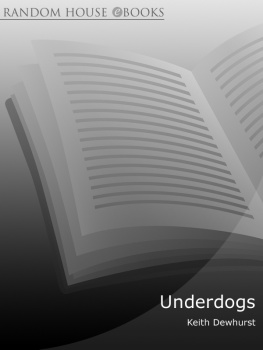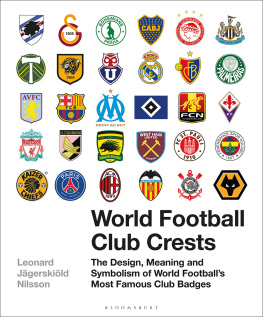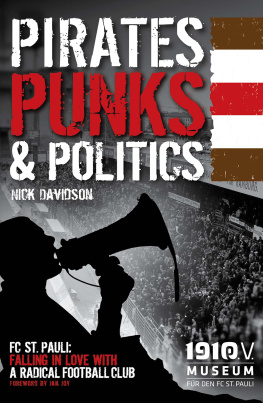St. Pauli
St. Pauli
Another Football is Possible
Carles Vias and Natxo Parra
Foreword by Deniz Naki
Translated from the Catalan by Luke Stobart
First published in Spanish as FC Sankt Pauli by Capitn Swing, 2017
Published in Catalan as Sankt Pauli: un altre futbol s possible by Tigre de paper, 2017
English language edition first published 2020 by Pluto Press
345 Archway Road, London N6 5AA
www.plutobooks.com
This translation is published by arrangement with Oh!Books Agencia Literaria The translation of this work has been supported by the Institut Ramon Llull
Copyright Carles Vias and Natxo Parra 2017; 2020
English language translation copyright Luke Stobart 2020
The right of Carles Vias and Natxo Parra to be identified as the authors of this work has been asserted in accordance with the Copyright, Designs and Patents Act 1988.
British Library Cataloguing in Publication Data
A catalogue record for this book is available from the British Library
ISBN 978 0 7453 4090 6 Paperback
ISBN 978 1 7868 0671 0 PDF eBook
ISBN 978 1 7868 0673 4 Kindle eBook
ISBN 978 1 7868 0672 7 EPUB eBook
This book is printed on paper suitable for recycling and made from fully managed and sustained forest sources. Logging, pulping and manufacturing processes are expected to conform to the environmental standards of the country of origin.
Typeset by Stanford DTP Services, Northampton, England
Simultaneously printed in the United Kingdom and United States of America
To Laia and Ona; Quim, Arriel, Roc and Aina; Guillem, sia and Frid; Roc and Olvia; Otger, Aniol and Arlet; Laia, Berta, Ona and Bru; Aina and Valeria.
May one day you see our ideal made real: that another football (and society) is possible.
Contents
Acknowledgements
This book would have been impossible without the generous cooperation of many FC St. Pauli fans, experts, and even players. Without that, the book would have had notable shortcomings. In this regard, we are especially grateful to Guida Maym and Deniz Naki for their willingness to help the project from the beginning; as well as for their goals on the pitch, work and commitment. These all have been a continuing source of inspiration.
We also have been fortunate to have benefited from the collaboration of Romina Garcia Hinsch, like Maym, a member of the St. Pauli womens football squad. Both players have provided testimonies that have enabled us to know deeply and first hand the clubs secrets and the experiences in the club of its main figures. FC St. Pauli itself has facilitated all that we needed to do our investigation, always very kindly heeding our requests. We therefore wish to acknowledge the courteous treatment we were given by Sven Brux, Snke Goldbeck, Hendrik Luettmer, and FC St. Pauli Frauen. A gratitude that we would like to extend to Heiko Schlesselmann, whom we met years ago when he was organising club-related anti-racist projects; and also to Hagar Groeteke, ex-footballer and today coach of FC Lampedusa St. Pauli, who provided us with new information regarding the creation of the clubs womens team.
Nor do we want to leave out those fans the Pirates very soul that we have interviewed or who have provided information. These include Volker Gajewski (thanks also for your hospitality each time we visited), Karl Heinz Pio Piotrowski, and the indefatigable Hernn Pirate of the South Garca. Likewise, a mention must be given to the great Stefan Groenveld, the photographer that has captured best St. Paulis aesthetic essence.
Lastly we would like to thank Ercan Ayboga for arranging the participation of Deniz Naki from distant Amed (Kurdistan); Btel, for his invaluable collaboration as translator; Toni Padilla and Frederic Porta, our first stealthy readers; and Aitor Lagunas, Roger Xuriach, and all of the fine people at Panenka magazine for putting their trust in us.
Our final regards go to Esteve Martorell and Francesc Poblet, who made up the managing core of the project and have always followed its development with interest. And other very special greetings go to the fan clubs in England, Scotland, Ireland and Catalonia, groups who, by their passion, commitment and solidarity, dignify love of football.
Foreword
Often I have been asked what is it that drives me to run after a ball for 90 minutes and what I hope to achieve by doing so. Having been born the son of some simple Kurdish economic migrants in the heart of Germany made me aware from very early on about what class society means. From an early age I wanted to be something. I could only dream of obtaining the fruits of wealth through the seed of football a truly simple pastime.
Over time, I became a focus of peoples attention. I am more aware now than ever that true wealth does not lie in football or the benefits or gifts provided by professional status, nor are they anything material. I have lived and learned, particularly in the period that I played at St. Pauli, that fraternity and solidarity among teammates but also with rivals can be an incredible strength. I saw that when we stand our ground backing each other up, nothing could beat us.
This team the pride of true Hamburgers taught me that borders only exist in our minds. It taught me what it means for people to support each other and to play for our teammates, coach, fans, and particularly the ticket sellers in the stadium. It taught me to be able to provide a positive experience for each of them. I no longer played just for me but for everyone. And everyone from car-park attendants to team captain makes the same contribution to achieving success.
Since my time at St. Pauli, I have continued to extend my motivation beyond the playing field. I try to use my platform in the media so that kids watching have a positive role model to identify with, and to draw peoples attention to crimes against humanity that are taking place. My aim is to bring a smile back to the faces of those I have been keener than ever to fight for these aims. I went with great enthusiasm to Amed, a city with a long history and walls as marvellous as its inhabitants. Both its walls and people have stood firm since eternity and form symbols of the fraternity between the different cultures that co-exist there. Yet in Amed children are dying and adults are butchered and imprisoned. And all of this is painful, really painful.
I wish to oppose and resist any form of oppression. With all of the resources I have at my disposal. Despite the repression suffered, I shall continue rebelling and not give in. The last thing they can take from me is my soul and my longing for freedom. St. Pauli taught me that the better I play with the team on the field, the more I can achieve. In Amed, I came across a lot of solidarity among its warm and affectionate people. I met proud people who resist out of dignity. I have learned a great deal from Amedspor, maybe the Kurdish St. Pauli, and will continue to do so.
Deniz Naki
_______________
[Translators note]: inhabitants of Hamburg
[Translators note]: a team associated with the Kurdish people

